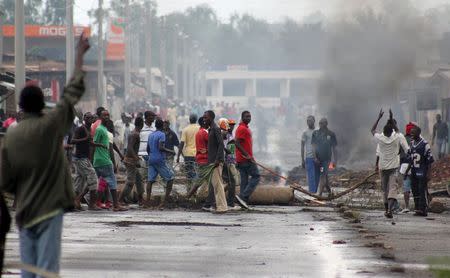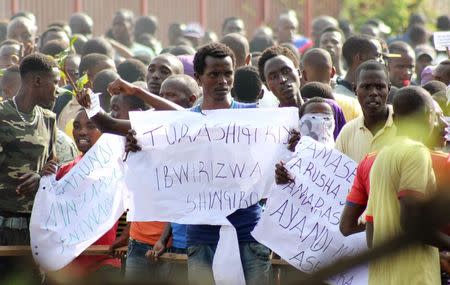Burundi president, facing protests, says third term would be his last
By Patrick Nduwimana BUJUMBURA (Reuters) - Burundi's president, confronted by violent protests that have left a dozen people reported dead and driven thousands to flee the country, said on Wednesday that if he is re-elected in June he will not run for office again. The protests were triggered by President Pierre Nkurunziza's decision to run for a third term, which the protesters say violates a constitutional limit of two terms. The constitutional court has ruled his first term did not count because he was picked by lawmakers, not elected by a popular vote. But the opposition say the court is biased and has vowed to keep protesting until he backs down. The row has plunged the nation into its worst crisis since the end of a 12-year civil war that pitted rebels from the majority Hutu ethnic group against the then-Tutsi-led army. "I would like to assure the national and international community that in case I am elected now, this will be my last term," he said in a televised speech. He said the security of all candidates in the coming campaign would be guaranteed and promised "peaceful, fair and inclusive" elections. "I call for the immediate stop of demonstrations and ask all political actors to prepare for elections," the president said. Nearly 40,000 Burundians have fled to neighbouring Rwanda, Tanzania and Democratic Republic of Congo in the past month as tensions have ratcheted up over Nkurunziza's bid for a third term bid, the U.N. refugee agency UNHCR said. The tensions particularly worry Rwanda, which has the same ethnic mix as Burundi and suffered a 1994 genocide that killed 800,000 people, most of them Tutsis and moderate Hutus. PROTESTERS INJURED Burundi's Red Cross said 16 people were injured in protests held in different parts of the capital on Wednesday. Protests have shown little sign of spreading beyond Bujumbura so far. Civil society groups say the death toll has reached at least 12 people since protests erupted after Nkurunziza, a former leader of a Hutu rebel group, announced his decision on April 25 to run again. Police put the death toll at half that number. Presidential challenger Audifax Ndabitoreye was arrested at a hotel in the capital Bujumbura where the east African ministers held meetings on the crisis. It was not immediately clear if he was participating in the talks. Ndabitoreye, who is not affiliated with the main opposition parties and wants to run as an independent, told reporters as he was led away by police that he was arrested for "participating in an insurrection movement". "I am a victim because I have been protesting clearly against the third term for Nkurunziza, which is illegal and unconstitutional," he said. The government calls the protests an insurrection and has detained scores of people. Nkurunziza ordered those under 18 to be released in his speech and said the other may be freed when the demonstrations stop. "All lights are blinking in Burundi. All alarms are going. So where's the fire brigade," Jan Egeland, the head of the Norwegian Refugee Council and former top humanitarian official for the United Nations, told a news conference in Geneva, calling for international action. U.S. Secretary of State John Kerry said this week in Nairobi during a regional trip that Nkurunziza's pursuit of a third term "flies in the face" of the constitution. Washington has said it would take measures against any individuals responsible for violence. Britain's Foreign Office noted in a statement: "Reports of intimidation against members of the constitutional court do not give the impression of an independent court that was able to come to an impartial decision." A senior member of the court was reported to have fled the country this week. The government dismisses charges of intimidation and says it allows free speech. (Additional reporting by Tom Miles in Geneva and Edmund Blair in Nairobi; Writing by Edmund Blair and Duncan Miriri; Editing by Larry King)

 Yahoo News
Yahoo News 

